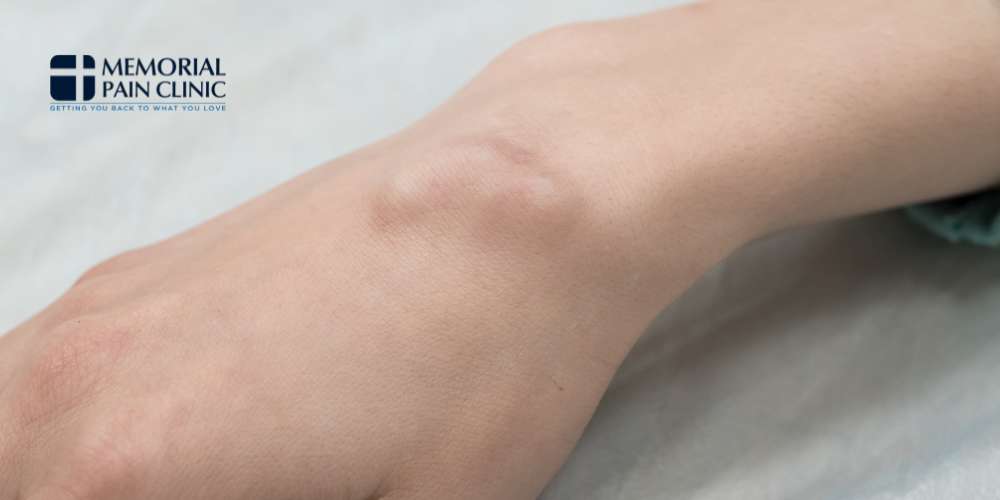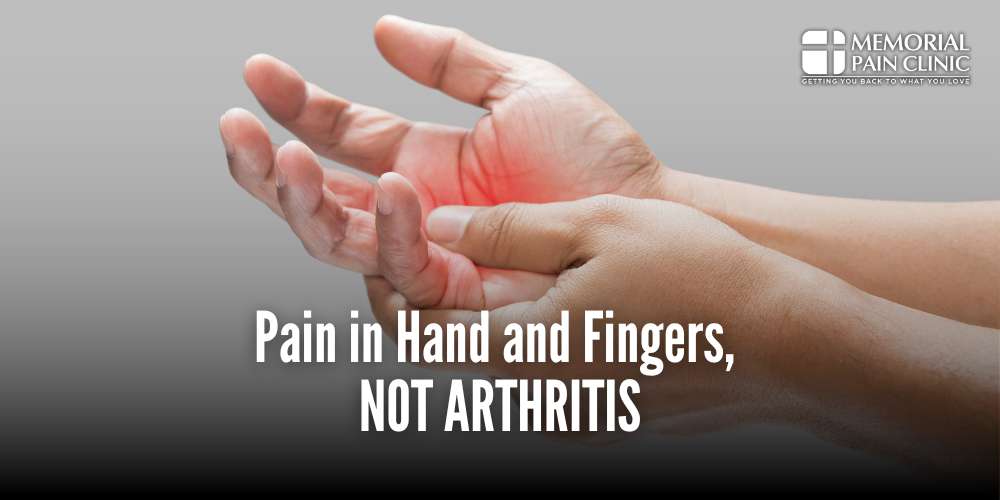Are you experiencing pain in your hands and fingers, not arthritis? Many other conditions can lead to finger pain, hand pain, and discomfort in the wrist. From issues with the median nerve to problems like trigger finger, various factors could be causing pain and muscle weakness, affecting your ability to perform everyday activities.
At Memorial Pain Clinic in Tulsa, we understand how frustrating it can be to deal with hand and finger pain that interrupts your daily life. Contact us today at (918) 200-9944 to schedule an initial appointment and start your journey toward pain relief.
What Are Some Common Causes of Hand and Finger Pain?

Several common causes of hand and finger pain don’t involve arthritis. The pain can stem from nerve issues, injuries, or certain medical conditions. If you’re experiencing finger, hand, or wrist pain, exploring the potential causes is important to understand what might lead to your symptoms.
Median Nerve Issues
One common cause of finger, hand, and wrist pain is related to the median nerve. This nerve runs through the wrist and into the hand, which can lead to carpal tunnel syndrome when compressed.
Common symptoms of carpal tunnel are numbness, tingling, or even muscle weakness in the hand, especially in the thumb, middle finger, and ring finger. If left untreated, these symptoms can worsen over time. Median nerve compression can affect one’s ability to grasp small objects, making daily tasks more challenging.
Hand and Finger Injuries
Injuries are another common source of finger, hand, and wrist pain. From sprains to fractures, these injuries can cause pain, swelling, and tenderness in the affected area. Damage to the finger tendons, tendon sheath, or soft tissue may also lead to finger pain and inflammation. Common activities, such as lifting heavy objects, can sometimes contribute to these injuries, leading to discomfort in the fingers, hand, and wrist.
Medical Conditions
Certain medical conditions can also cause pain in the fingers, hand, and wrist. Conditions like peripheral neuropathy or Raynaud’s phenomenon may affect blood flow and nerve function, leading to cold, tingling, or pain sensations.
Ganglion cysts, fluid-filled lumps, can form along the tendons or joints and cause pain when pressing on nearby structures. Additionally, autoimmune conditions such as rheumatoid arthritis may cause symptoms that overlap with other common causes of pain in the hands.
Types of Hand and Finger Pain

Hand and finger pain can vary greatly in nature and intensity, making it important to identify the discomfort you’re experiencing. Whether your pain is accompanied by swelling, throbbing, or a sharp sensation, each type may point to a different underlying issue.
Some people also experience pain with lumps or bumps in their hands, which could signal specific conditions like ganglion cysts. Recognizing the specific type of finger, hand, or wrist pain is crucial to finding the right treatment.
Pain with Swelling
If your finger pain is accompanied by swelling, it could indicate an injury or inflammation in the soft tissue or tendons. Swelling often occurs after trauma or repetitive strain on the hand and wrist, leading to discomfort and limited movement.
Conditions like trigger finger or tendon sheath inflammation can cause the affected area to swell, making it difficult to bend or straighten the affected finger.
Throbbing Pain
Throbbing hand or finger pain may feel like a pulsing or consistent ache. This type of pain is often a response to inflammation, injury, or even issues with blood flow in the hands. Throbbing pain can be related to conditions like Raynaud’s phenomenon or nerve-related issues like carpal tunnel syndrome. This type of pain may worsen with use and be more noticeable during rest periods or at night.
Sharp or Shooting Pain
Sharp or shooting pain in the hands or fingers is often a sign of nerve-related issues. Conditions like carpal tunnel syndrome or peripheral neuropathy may cause this type of pain, radiating up through the wrist or down to the fingertip. This shooting pain may come and go suddenly, triggered by certain movements or positions.
Pain with Lumps or Bumps
When pain in the hands or fingers is associated with lumps or bumps, it’s often due to a ganglion cyst or other growths along the tendons or middle or end joints. These bumps are usually fluid-filled and can cause discomfort, especially if they press on nearby nerves or blood vessels. Though typically non-cancerous, they can cause significant pain and may interfere with normal hand function, particularly if they form near a middle joint or another critical area of the hand.
What Conditions That Are Not Arthritis Can Cause Pain in Hands and Fingers?

While arthritis is a well-known cause of hand and finger pain, many other conditions can lead to similar symptoms without being arthritis-related. From nerve issues to injuries, these conditions can cause discomfort, inflammation, and sometimes limited mobility in your hands and fingers.
Understanding these non-arthritis conditions is essential for identifying what might be causing pain in your finger joints or wrist. Below are some common conditions that may explain your finger, wrist, or hand pain.
Trigger Finger
Trigger finger occurs when the finger tendon becomes inflamed, making it difficult to bend or straighten the affected finger. As the tendon sheath becomes irritated, it can catch or lock, causing pain and discomfort in the finger. This condition commonly affects the middle finger or ring finger and may worsen with repetitive hand movements. If you feel a “clicking” sensation or stiffness in the affected finger, trigger finger could be the cause.
Carpal Tunnel Syndrome
Carpal tunnel syndrome results from compression of the median nerve as it passes through the wrist, leading to numbness, tingling, or sharp pain in the hand and fingers. This condition often affects the thumb, index, and middle fingers, causing discomfort that can worsen at night or after repetitive hand use. Carpal tunnel can interfere with your ability to grip objects and perform everyday activities, making it a common source of hand pain.
Boxer’s Fracture
A Boxer’s fracture is a break in the bones of the hand, typically involving the bones near the ring finger or pinky finger. This type of fracture is commonly caused by punching something with a closed fist, which explains its name. Common symptoms include pain, swelling, and difficulty moving the affected fingers. If left untreated, this type of fracture can lead to long-term complications, such as reduced hand function or chronic pain.
De Quervain’s Tenosynovitis
De Quervain’s tenosynovitis affects the tendons on the thumb side of your wrist, causing pain when you turn your wrist, grasp objects, or make a fist. The condition involves tendon sheath inflammation, leading to pain and swelling near the thumb joint. De Quervain’s is often the result of repetitive strain or overuse.
Ganglion Cysts
Ganglion cysts are non-cancerous lumps that can form along several tendons or joints of the hands and wrists. These fluid-filled cysts can cause pain if they press on nearby nerves or blood vessels, especially during movement. While the cysts may be harmless, they can lead to discomfort and swelling, particularly if they increase in size or interfere with normal hand function.
Raynaud’s Phenomenon
Raynaud’s phenomenon affects the blood vessels in your hands, causing them to constrict in response to cold temperatures or stress. This reduces blood flow to your fingers, resulting in color changes, numbness, and pain. In severe cases, Raynaud’s can lead to sores or ulcers, requiring attention if you experience frequent flare-ups.
Peripheral Neuropathy
Peripheral neuropathy occurs when the nerves outside the brain and spinal cord (such as those in your hands) become damaged. This condition can cause various symptoms, including sharp pain, tingling, numbness, or a burning sensation in the hands and fingers. It can be caused by autoimmune diseases, infections, or exposure to toxins. Peripheral neuropathy often worsens over time and can significantly affect hand function.
How Is Hand and Finger Pain Diagnosed?
Diagnosing the cause of hand and finger pain involves a combination of physical examination, medical history, and diagnostic tests. During your initial appointment, a doctor will evaluate your symptoms, such as where the pain is located, whether it’s constant or intermittent, and if it worsens with certain movements. They will also check for visible signs like swelling, lumps, or limited range of motion in the affected area.
In many cases, additional tests may be necessary to pinpoint the cause of the pain in your hands and fingers. Diagnostic imaging, such as X-rays or MRIs, can help identify fractures, tendon issues, or ganglion cysts. Nerve tests, such as an electromyography (EMG) or nerve conduction study, are often used if carpal tunnel syndrome or peripheral neuropathy is suspected. Once the cause of your pain is identified, an appropriate treatment plan can be developed.
How Do We Treat Pain in the Fingers and Hands That Isn’t Arthritis?

At Memorial Pain Clinic, we focus on non-surgical, non-physical therapy treatments for finger and hand pain. Treatment options are personalized based on the underlying cause of your pain, and the goal is to reduce discomfort while restoring function.
For conditions like trigger finger, carpal tunnel syndrome, or ganglion cysts, treatment may involve the use of nonsteroidal anti-inflammatory drugs (NSAIDs) to help reduce swelling and alleviate pain. Injections, such as corticosteroids, can also effectively reduce inflammation and provide longer-lasting relief for conditions related to nerve compression or tendon inflammation.
In addition to medication, lifestyle changes may also help manage finger and hand pain. Avoiding repetitive motions, using ergonomic tools, or wearing splints to stabilize the affected area may help prevent symptoms from worsening. For some individuals, modifying daily activities and giving the hands time to rest can help alleviate pain.
By tailoring your treatment plan to your specific needs, we can address the underlying cause of your pain and work toward improving your quality of life without the need for manual therapy techniques, physical therapy, or surgery.
Contact Memorial Pain Clinic for Hand and Finger Pain Treatment in Tulsa
If you’re struggling with pain in your hands or fingers, not arthritis, don’t wait to seek relief. At Memorial Pain Clinic, we offer personalized treatment plans to address a wide range of conditions, from carpal tunnel syndrome to ganglion cysts.
Contact us today at (918) 200-9944 to schedule an appointment and start your journey toward pain relief.

